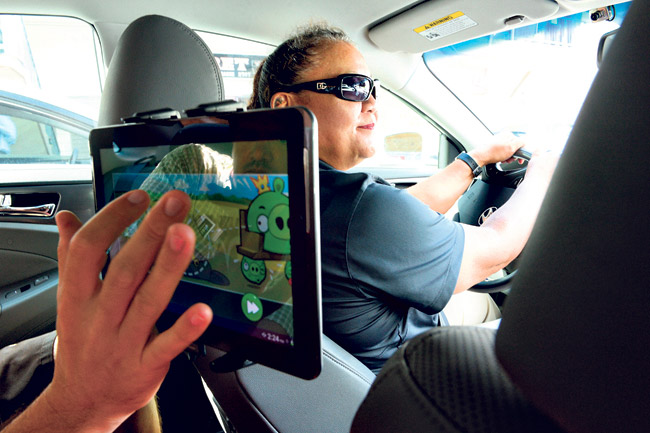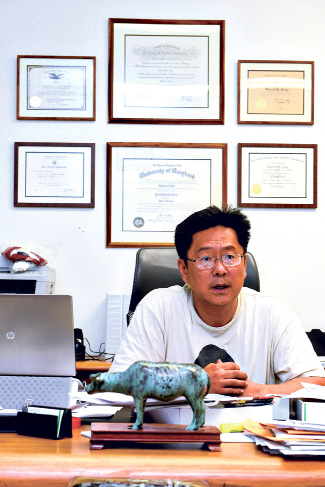Reinventing The Taxi Business
EcoCab uses hybrid cars, hires its drivers, trains them in customer service and provides tablets in the backseat. It’s a new way to ride
It all starts with an idea, right? Find an existing product and make it better.
Edison got tired of a drafty, old house always extinguishing his reading illumination, and Ford got tired of the smell of horse manure.
For David Jung, he got tired of the entire taxi experience: taking the “scenic route,” odorous cars and less-than-knowledgeable drivers.
So rather than complain about it, he decided to do something – and that something came to life Sept. 1 in the form of a shiny new local company named EcoCab.
“There is one consistent deficiency over the past 20 years in Honolulu, and that has been ground transportation – and specifically the taxi,” says Jung, who moved to Hawaii in 1989 to practice real estate and corporate law. “It was really apparent that was one area I could really make a difference in.”
The taxi business may seem like a leap for an attorney, but as he watched the transformation of Waikiki in recent years, he felt that itch for a new challenge in his life.
“I always said I wanted to do something before I turned 50, and I turned 50 this year,” says Jung, who retired from his position as executive vice president with Hilo Hattie to pursue this foray into the people-moving business. “I wanted to do something customer service-oriented.
“I saw how the tourist industry as a whole was positioning Hawaii as a world-class tourist destination, from retail to lodging to food and beverage. All phases of hospitality have been upgraded over the past couple years. We need to elevate the standard of taxis for the tourists – cabs are the front line, they are one of the faces of Hawaii tourism.”
His business plan was simple: Change the paradigm of the cab business. Up until now in Honolulu, cab companies serve only as a dispatching service – you call a Frank De Lima-sung batch of numbers and they call one of their independently contracted cars to pick you up. Every dollar that driver charges you goes into his or her pocket, giving them all the incentive any of us would need to take their time and the long way home.
At EcoCab, Jung has brought drivers into the company, offering them a position as actual employees and the security of an hourly wage.
“It costs us substantially more to have our drivers as employees as opposed to independent contractors, but if you are intent on controlling quality, you don’t really have a choice,” says Jung, who has 11 cars now but hopes to expand it to 25 by December. “If they are independent, they are in it for themselves.
“Our employees earn their salary and their tip, but if you ask our drivers to take you from point A to point B, anecdotally, our fares will be 10 percent to 20 percent less because our driver will take you on the most direct route, because the fare itself goes into the company’s pocket, not their pocket. Whereas an independent contractor will catch every stoplight, etc., because there is a built-in incentive to maximize that fare.”
Despite the added overhead generated by its employee-driver philosophy, the company has kept its flag drop and per-mile rates the same as the big boy cab companies in town.
The name EcoCab comes from the fact that the entire fleet is made up of brand new Hyundai Sonata hybrids, which Jung says create half the carbon footprint of typical cabs.
“The eco movement is no longer a fringe movement, it is totally mainstream,” says Jung. “It is something that everyone practices all the time. Clearly there is a market demand for anything eco, especially if it makes sense.
“But being hybrid is not our singular distinction – our greatest competitive advantage is our customer service. We are not just drivers, we are tour guides.”
All EcoCab drivers are put through a four-week training course that prepares them not just for the driving tests they must pass, but the service requirements that Jung expects from his drivers.
They also are given rudimentary Japanese and Korean language lessons, classes in Hawaiian culture and even lifesaving skills such as CPR.
Most of the 36 drivers are young people in their 20s and 30s, and all but one of them have never driven a cab before – and that was a deliberate choice.
“We wanted to start them from scratch because old habits are hard to break,” says Jung. “I have seen the habits of existing drivers and I did not like it. We wanted to get a clean sheet of paper.”
Changing the public’s perception of the cab driver also is something he hopes to do with his new philosophy.
“The one thing I truly want for them is to be respected,” says Jung, who outfits drivers in Dri-FIT polos with an EcoCab logo. “The taxi industry has become the profession of last resort, for some reason, but we are doing something really important.
“FedEx and UPS guys are really respected, and they are hauling around packages. Our guys are hauling around live human beings – someone’s daughter, someone’s wife. It is a very important job, and my drivers need to be respected, but they must earn that.”
He trains them to earn that respect by bringing back the lost art of courtesy. His drivers open doors for their guests, hold an umbrella over them in the rain and even pull up all the way to the hotels or houses rather than wait at the bottom of driveways.
These old-fashioned manners are catching the eyes of the local high-end hotels, with Modern Honolulu signing on as EcoCab’s first big commercial account.
“We want to continue the hotel experience. They are receiving world-class customer service, and that experience should not break when one gets into a cab,” says Jung, who outfits each of his cabs with a tablet for the guests’ use, as well as Wi-Fi. “It should be a continuation of that experience – that is the emphasis to our drivers and our commitment to the hotels.”







